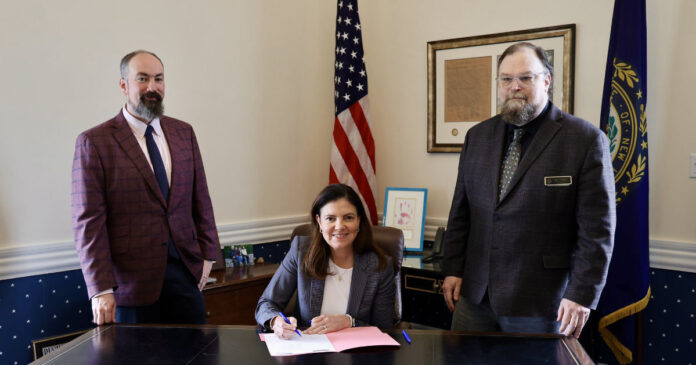In a groundbreaking and historic step, New Hampshire is now the first state in the United States to officially establish a strategic cryptocurrency reserve. Signed into law on Monday, the measure is a huge win for the digital asset community, particularly given that a number of other states have been unable to pass comparable legislation in recent months.
The legislation, H.B. 302, permits the state treasurer to invest a maximum of 5% of New Hampshire’s state money in precious metals and digital currencies. But these digital currencies have to pass a key test: a market capitalization of more than $500 billion. This requirement essentially limits the qualifying crypto to bitcoin, the most mature and capitalized digital currency.
“First in the Nation” Again
Governor Kelly Ayotte boasted on Tuesday through the platform X (formerly known as Twitter) that she signed the new law, stating, “New Hampshire is once again First in the Nation! Just signed a new law permitting our state to invest in cryptocurrency and precious metals.”
Supporters from both sides of the state’s political spectrum welcomed the action as innovative and budget-friendly. House Republicans highlighted the state’s pioneering effort, stating, “The Live Free or Die state is on the cutting edge of shaping the future of commerce and digital assets.”
Also read: Flash Floods Force Louisiana School & State Office Closures May 7
A Lone Victory Among National Setbacks
New Hampshire’s breakthrough follows a series of unsuccessful crypto reserve proposals in other states. In Arizona, Democratic Governor Katie Hobbs recently vetoed legislation that would have enabled the state to use seized cryptocurrency to construct a reserve. Florida also pulled two crypto-related bills from its legislative session earlier this week.
Other states that previously rejected comparable legislation are Oklahoma, South Dakota, Montana, North Dakota, Pennsylvania, and Wyoming. New Hampshire’s H.B. 302 passage, by contrast, shows an emerging division in the ways states consider digital currencies in their economic future.
Inspired by Federal Momentum
New Hampshire’s crypto reserve effort is reflective of federal efforts. President Trump, in a March executive order, tasked the establishment of a federal bitcoin reserve using cryptocurrency assets confiscated in investigations into financial crimes. The order also called on the Treasury and Commerce Departments to seek means of acquiring additional bitcoin without adding to government expenditures.
Trump’s administration made sure to stress that these operations would be budget-neutral, putting no additional burdens on taxpayers. David Sacks, Trump’s appointed AI and crypto czar, has put the federal government’s estimated holdings at around 200,000 bitcoins, valued at more than $17 billion. But still pending is a formal audit.
Crypto’s Reputation Rebounds
This state-level excitement is a part of a larger trend. Following years of scandals and volatility in the market, crypto is being reimagined as a stable, long-term asset class. As bitcoin breaks through big financial milestones, policymakers are beginning to take it seriously as a more than just a speculative vehicle.
New Hampshire’s crypto reserve move gives credence to this evolving narrative. It treats bitcoin as a genuine financial hedge. It is accompanied by precious metals like gold which is against economic uncertainty and inflation.
Also read: NASA-Backed Study Predicts Earth’s Oxygen Depletion in a Billion Years
Strategic Implications and National Interest
New Hampshire leads the way with the new law, placing it in a position of leadership in digital financial innovation. Investing a small portion of state revenues in digital and physical stores of value, the state is taking a hedge against fiscal uncertainty and sending a signal to other states: crypto here to stay.
Whether other states will emulate New Hampshire is still to be known. But currently, the Granite State is it alone, leveraging digital potential for public policy and doing so clearly with a perception of strategy, timing, and risk management.








